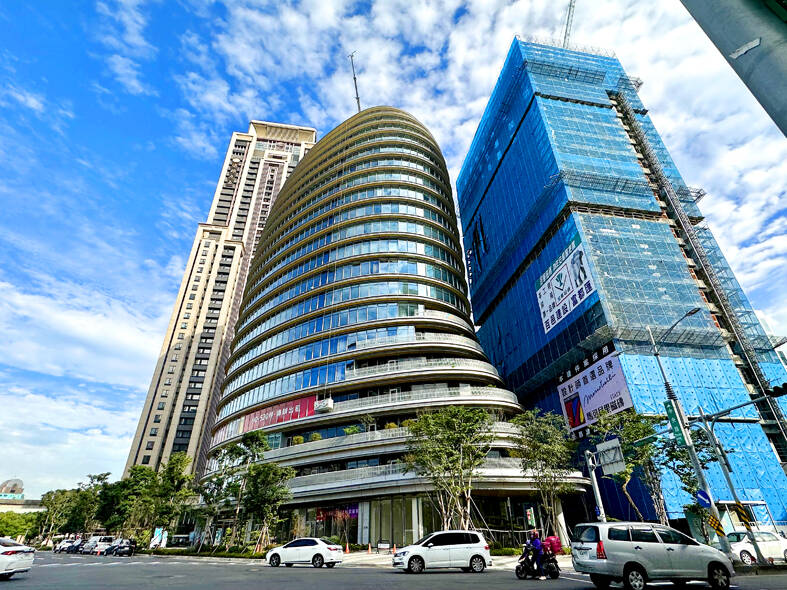Commercial property transactions in Taiwan increased 2.8 percent to NT$137 billion (US$4.46 billion) this year, mainly due to demand for offices and factories, but land deals tumbled 20.4 percent to a six-year low of NT128.4 billion due to unfavorable lending terms, Colliers International Taiwan (高力國際) said on Wednesday.
The property market would be stronger next year, as a monetary tightening cycle is likely over, giving firms more financial muscle to expand capacity and boost their real-estate holdings, the property broker said.
Self-occupancy demand for offices and factories contributed 53 percent of commercial property deals, or NT$73.2 billion, Colliers Taiwan senior research director Eilleen Liang (梁儀盈) told a news conference in Taipei, citing transaction data for the year to Monday.

Photo: Hsu Yi-ping, Taipei Times
A real-estate investment trust in June sold two office buildings in Taipei’s Songshan District (松山) for NT$2.98 billion and NT$2.45 billion, suggesting a premium of 1.1 percent and 5.3 percent respectively despite a sluggish economy, Liang said.
As for industrial property deals, a Hon Hai Precision Industry Co (鴻海精密) affiliate bought a factory complex in New Taipei City’s Tucheng District (土城) and Topco Scientific Co (崇越科技), a distributor of semiconductor materials, purchased an office building in Taipei’s Neihu District (內湖), Colliers Taiwan said.
Local insurers, normally the main commercial property players, failed to make the list of the top 10 deals this year, Colliers Taiwan managing director Andrew Liu (劉學龍) said, calling the situation rare.
Liu attributed the absence to a series of interest rate hikes that drove up the minimum yield requirement to 2.875 percent for real-estate investments by insurance companies.
Rising property prices make it difficult to pass the test in the first place, he added.
Land deals were weaker despite help from auctions of public plots of land in Taichung and Kaohsiung this quarter, Liu said.
“It was unusual to see no land deals in excess of NT$5 billion this year,” Liu said, adding that credit controls and other unfavorable measures were to blame.
Hung Yuan Development Co (宏園建設) and Ruicheng Construction Co (瑞誠建設) jointly bought a plot of land in Taipei’s Beitou District (北投) for NT$4.79 billion, making it the largest deal by value, Colliers Taiwan said.
Looking ahead, there is no reason not to be positive about the property market, Liu said.
The world is keen about the prospects for artificial intelligence, so Taiwanese firms in the supply chain would benefit and need more office space, Colliers Taiwan said.
Local insurers and developers also would boost their holdings once the US Federal Reserve lowers interest rates, it said, adding that inflation pressure appears to have been brought under control.

GROWING OWINGS: While Luxembourg and China swapped the top three spots, the US continued to be the largest exposure for Taiwan for the 41st consecutive quarter The US remained the largest debtor nation to Taiwan’s banking sector for the 41st consecutive quarter at the end of September, after local banks’ exposure to the US market rose more than 2 percent from three months earlier, the central bank said. Exposure to the US increased to US$198.896 billion, up US$4.026 billion, or 2.07 percent, from US$194.87 billion in the previous quarter, data released by the central bank showed on Friday. Of the increase, about US$1.4 billion came from banks’ investments in securitized products and interbank loans in the US, while another US$2.6 billion stemmed from trust assets, including mutual funds,

Micron Memory Taiwan Co (台灣美光), a subsidiary of US memorychip maker Micron Technology Inc, has been granted a NT$4.7 billion (US$149.5 million) subsidy under the Ministry of Economic Affairs A+ Corporate Innovation and R&D Enhancement program, the ministry said yesterday. The US memorychip maker’s program aims to back the development of high-performance and high-bandwidth memory chips with a total budget of NT$11.75 billion, the ministry said. Aside from the government funding, Micron is to inject the remaining investment of NT$7.06 billion as the company applied to participate the government’s Global Innovation Partnership Program to deepen technology cooperation, a ministry official told the

Taiwan Semiconductor Manufacturing Co (TSMC, 台積電), the world’s leading advanced chipmaker, officially began volume production of its 2-nanometer chips in the fourth quarter of this year, according to a recent update on the company’s Web site. The low-key announcement confirms that TSMC, the go-to chipmaker for artificial intelligence (AI) hardware providers Nvidia Corp and iPhone maker Apple Inc, met its original roadmap for the next-generation technology. Production is currently centered at Fab 22 in Kaohsiung, utilizing the company’s first-generation nanosheet transistor technology. The new architecture achieves “full-node strides in performance and power consumption,” TSMC said. The company described the 2nm process as

JOINT EFFORTS: MediaTek would partner with Denso to develop custom chips to support the car-part specialist company’s driver-assist systems in an expanding market MediaTek Inc (聯發科), the world’s largest mobile phone chip designer, yesterday said it is working closely with Japan’s Denso Corp to build a custom automotive system-on-chip (SoC) solution tailored for advanced driver-assistance systems and cockpit systems, adding another customer to its new application-specific IC (ASIC) business. This effort merges Denso’s automotive-grade safety expertise and deep vehicle integration with MediaTek’s technologies cultivated through the development of Media- Tek’s Dimensity AX, leveraging efficient, high-performance SoCs and artificial intelligence (AI) capabilities to offer a scalable, production-ready platform for next-generation driver assistance, the company said in a statement yesterday. “Through this collaboration, we are bringing two